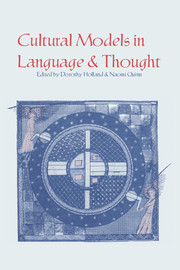Book contents
- Frontmatter
- Contents
- Preface
- List of Contributors
- Introduction
- Part I Presupposed worlds, language, and discourse
- Part II Reasoning and problem solving from presupposed worlds
- Part III The role of metaphor and analogy in representing knowledge of presupposed worlds
- Part IV Negotiating social and psychological realities
- 11 Myth and experience in the Trobriand Islands
- 12 Goals, events, and understanding in Ifaluk emotion theory
- 13 Ecuadorian illness stories
- 14 Explanatory systems in oral life stories
- Part V An appraisal
- Index
11 - Myth and experience in the Trobriand Islands
Published online by Cambridge University Press: 05 June 2012
- Frontmatter
- Contents
- Preface
- List of Contributors
- Introduction
- Part I Presupposed worlds, language, and discourse
- Part II Reasoning and problem solving from presupposed worlds
- Part III The role of metaphor and analogy in representing knowledge of presupposed worlds
- Part IV Negotiating social and psychological realities
- 11 Myth and experience in the Trobriand Islands
- 12 Goals, events, and understanding in Ifaluk emotion theory
- 13 Ecuadorian illness stories
- 14 Explanatory systems in oral life stories
- Part V An appraisal
- Index
Summary
This chapter examines how the knowledge of a myth is brought to bear on the interpretation of experience. This topic requires an eclectic approach since the issues it raises are simultaneously part of a venerable tradition in anthropology concerning the role of myth in society and part of a new research area in cognitive science concerning the nature of the processes by which people interpret and understand their world.
The experiences to be interpreted are those surrounding an encounter between a Trobriand Island village and the spirit of one of its recently deceased members. I begin with a brief ethnographic sketch of the nature of spirits of the dead in the Trobriand Islands, which will enable the reader to make sense of the events reported. The next section describes an actual case of a spirit haunting a village. This haunting set the stage for the phenomenon we wish to understand – that is, an old woman's account of how she saw a cosmological question in these events and how a sacred myth provided her with an answer to her question. The heart of the paper is an examination of the relationship between the myth itself and the phenomena it is marshaled to explain. I argue that the myth has two kinds of connections to experience. One is an explicit link based on a belief in the power of mythic events as historical precedents.
- Type
- Chapter
- Information
- Cultural Models in Language and Thought , pp. 269 - 289Publisher: Cambridge University PressPrint publication year: 1987
- 8
- Cited by



